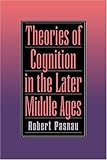Theories of cognition in the later Middle Ages / Robert Pasnau
Material type: TextPublication details: Cambridge, Cambridge University Press, 1997Description: xi, 330 pages ; 24 cmISBN:
TextPublication details: Cambridge, Cambridge University Press, 1997Description: xi, 330 pages ; 24 cmISBN: - 0521583683
- 9780521583688
- ARCH YNDC 128.2 P282T 20
- BD161 .P37 1997
| Item type | Current library | Collection | Call number | Copy number | Status | Date due | Barcode | |
|---|---|---|---|---|---|---|---|---|
 Archives
Archives
|
SAIACS Archives Room | Yandell Collection | ARCH YNDC 128.2 P282T (Browse shelf(Opens below)) | C.1 | Not for loan | 064943 | ||
 Archives
Archives
|
SAIACS Archives Room | Yandell Collection | ARCH YNDC 128.2 P282T (Browse shelf(Opens below)) | C.2 | Not for loan | 064967 |
Includes bibliographical references (p. 311-319) and index
1. Immateriality and intentionality -- 2. Intentionality made mysterious -- 3. Form and representation -- 4. Passivity and attention -- 5. Are species superfluous? -- 6. Aquinas and direct realism -- 7. The veil of species -- 8. Word and concept -- App. A. The identity of knower and known (Aquinas) -- App. B. Henry of Ghent and intelligible species
This book is a major contribution to the history of philosophy in the later medieval period (1250-1350). It focuses on cognitive theory, a subject of intense investigation during these years. In fact, many of the issues that dominate philosophy of mind and epistemology today - intentionality, mental representation, skepticism, realism - were hotly debated in the later medieval period. The book offers a careful analysis of these debates, primarily through the work of Thomas Aquinas, Peter John Olivi, and William Ockham. Both Olivi and Ockham attempt to reconceptualize cognition along direct realist lines, criticizing in the process standard Aristotelian accounts of the sort proposed by Aquinas
Though of primary interest to medieval philosophers, the book presupposes no background knowledge of the medieval period, and will therefore interest a broader community of philosophers concerned with the origins of contemporary cognitive theory
There are no comments on this title.

